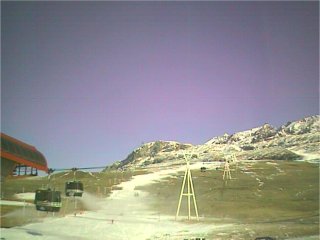
Baring a major incident (volcanic eruption, nuclear war, someone leaving the door open on one of those American style fridges) climatologists at NASA’s Goddard Institute for Space Studies are warning that 2005 will be the hottest year on record. Average temperatures taken from 7,200 weather stations around the world already make this year 0.4°C warmer than 1998, the previous hottest year.

Global temperatures for 2005 are currently about 0.75°C above the average temperature recorded between 1950 to 1980. Warming is greatest in the Northern Hemisphere. Scientists are predicting a 1.5°C to 6°C rise over the 21st Century but behind these averages the planet can expect more extreme weather. High surface water temperatures over the Gulf of Mexico have been blamed for the intensity of hurricane Katrina that brought devastation to New Orleans.
Climate news is a hot topic this autumn with scientist predicting both that the Artic will be free of sea ice by the end of the century and that the Siberian tundra is on the verge of a tipping point where temperatures will become hot enough to free billions of tones of methane, a powerful greenhouse gas, currently trapped by the permafrost.
In September researchers at NASA and the University of Colorado said that the Arctic sea ice cap shrank to just 200 million square miles, 500,000 square miles less than its average area between 1979 and 2000. This trend may accelerate as open water absorbs more heat than ice. The disappearance of artic ice will spell doom for polar bears who depend on the ice cover for hunting.
This is all bad news for skiers and local warming means that the picture may be worse for the French Alps. Global warming has been calculated at +0.95°C over the previous century but records at Lyon Bron close to the major ski areas of the Savoie and Haute-Savoie has seen average temperatures rise by 1.78°C between 1921 and 2003. Météo France has also recorded a 30% decrease in precipitation (rain and snowfall) for the Savoie department over the last 30 years. Bad news for snow cover and likely to increase competition for precious water resources between ski resorts and local communities over the next decade.
Accurate temperature records have only been kept since the start of the last century and some scientists are sceptical of the figures saying that there are simply not enough measurements to produce a reliable global figure and that the growth of urban hotspots has skewed the data. Data records have been reconstructed over the 420,000 years from ice cores taken to 3,300 meters depth at Vostok in the Antartic. Present day temperatures are now approaching those of the last maximum, 130,000 years ago.
Meltdown for European Skiing (3 Nov 2004)
Global Warming and Skiing Special Report